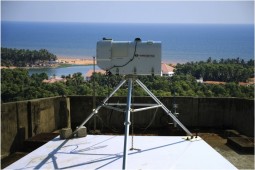 Bees and Pesticides (start at 6:40). Two studies published last week in the journal Science (here and here) make a strong case for beekeepers who worry that a new class of pesticides called “neonicotinoids” hurts honeybees and bumblebees. In recent years, honeybee populations have rapidly declined, in part due to a phenomenon known as Colony Collapse Disorder. Bumblebee populations have been suffering as well. Researchers have proposed many causes for these declines, including pesticides, but it’s been unclear exactly how pesticides cause damage. Both of the new studies looked at the effects of neonicotinoid insecticides, which were introduced in the early 1990s and have now become one of the most widely used crop pesticides in the world. One study, from the United Kingdom, shows that the pesticides reduce a bee’s ability to store enough food and to produce new queens. In a second study, French researchers tied tiny radios to honeybees then exposed them to low levels of the pesticides; a high number of the bees lost their sense of direction and died away from the hive. These two new studies add to concerns raised in January by a Purdue University study, which indicated that neonicotinoids persist, as poisons, in both plants and soil for much longer than thought, increasing the chance of the pesticide to harm bees and other insects. Despite the increasing number of studies calling into question the safety of these pesticides, the EPA has done little to restrict their use. Local beekeeper Tom Theobald talks with How on Earth’s Shelley Schlender that when it comes to honeybees, these are dangerous pesticides. You can hear the extended version of this interview on this website.
Bees and Pesticides (start at 6:40). Two studies published last week in the journal Science (here and here) make a strong case for beekeepers who worry that a new class of pesticides called “neonicotinoids” hurts honeybees and bumblebees. In recent years, honeybee populations have rapidly declined, in part due to a phenomenon known as Colony Collapse Disorder. Bumblebee populations have been suffering as well. Researchers have proposed many causes for these declines, including pesticides, but it’s been unclear exactly how pesticides cause damage. Both of the new studies looked at the effects of neonicotinoid insecticides, which were introduced in the early 1990s and have now become one of the most widely used crop pesticides in the world. One study, from the United Kingdom, shows that the pesticides reduce a bee’s ability to store enough food and to produce new queens. In a second study, French researchers tied tiny radios to honeybees then exposed them to low levels of the pesticides; a high number of the bees lost their sense of direction and died away from the hive. These two new studies add to concerns raised in January by a Purdue University study, which indicated that neonicotinoids persist, as poisons, in both plants and soil for much longer than thought, increasing the chance of the pesticide to harm bees and other insects. Despite the increasing number of studies calling into question the safety of these pesticides, the EPA has done little to restrict their use. Local beekeeper Tom Theobald talks with How on Earth’s Shelley Schlender that when it comes to honeybees, these are dangerous pesticides. You can hear the extended version of this interview on this website.
 Radiometers and Weather (start at 12:50). Predicting the weather is a tough job, and climate change is bringing unseasonal conditions that make it even more difficult to predict. But a monitoring device produced here in Boulder may be able to improve local weather forecasts significnatly. These radiometers work by creating 3-D profiles of the moisture in the air, which is a key element for meteorologists and climate modelers alike. They are now being put to various weather-related uses all over the planet. Stick Ware is the founder and lead scientist of the Boulder-based company, Radiometrics, and he’s here in the studio with us today to give us the scoop on these radiometers.
Radiometers and Weather (start at 12:50). Predicting the weather is a tough job, and climate change is bringing unseasonal conditions that make it even more difficult to predict. But a monitoring device produced here in Boulder may be able to improve local weather forecasts significnatly. These radiometers work by creating 3-D profiles of the moisture in the air, which is a key element for meteorologists and climate modelers alike. They are now being put to various weather-related uses all over the planet. Stick Ware is the founder and lead scientist of the Boulder-based company, Radiometrics, and he’s here in the studio with us today to give us the scoop on these radiometers.
Hosts: Joel Parker, Breanna Draxler
Producer: Joel Parker
Engineer: Jim Pullen
Headline Contributors: Susan Moran, Jim Pullen
Executive Producer: Joel Parker
Listen to the show:
Podcast: Play in new window | Download (Duration: 24:14 — 22.2MB)
Subscribe: RSS




One thought on “Bees and Pesticides // Radiometers and Weather”